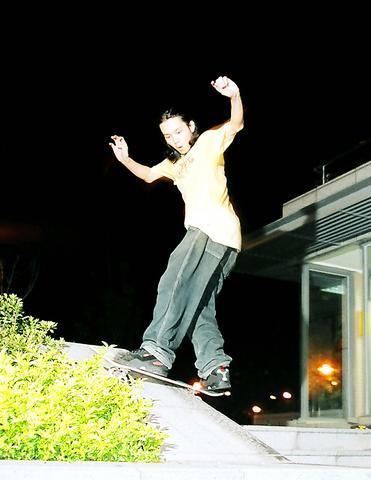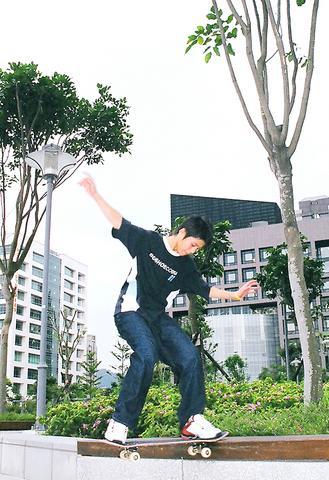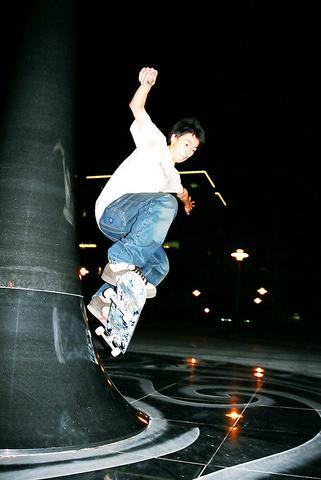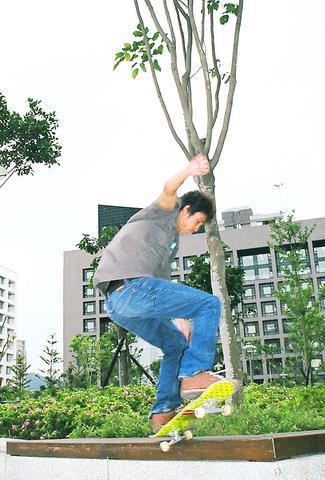Punk band Faction's Skate and Destroy was written in the early 1980's in response to the association of skateboarding with vandalism in North America. While much of the action has been pushed off the streets and into skate parks in other countries, Taiwan remains a skater-friendly spot for local and foreign boarders alike. With a large number of concrete parks and courtyards, and no enforced legislation against using them, Taipei city has a number of ideal locations to ride.
"There are places everywhere. Most of the public parks have perfect rails and ledges to grind. You don't need to go to a skate park to skate in Taiwan," said Paul Clenton, who has been riding here for more than seven years.

PHOTO COURTESY OF JIMMY SUN
The major difference for Clenton, who is used to being banned from skating in public areas in the UK, is the lack of hassle from local authorities. Pointing to a sign outside Zhongshan Hall (

PHOTO COURTESY OF JIMMY SUN
Skateboarding originated in the US in the 1950s with the Roller Derby, a wooden board with clay wheels. It was another 20 years before skating gained marginal popularity, mostly among surfers who would take to the streets and empty pools when the waves were low. Skateboarding, like surfing, was a lifestyle rather than a sport. As time passed it claimed its own niche, separate from surfing, and rare was the day that a skater would be caught with out his or her deck.
A few American films formed initial interest in Taiwan during the mid-1980s and, much like the US, the majority of those who took up the sport were surfers, said Jimmy Sun (

PHOTO COURTESY OF JIMMY SUN
What started as a small shop to provide him and his cronies with quality gear has grown into three stores and the largest distribution of decks in Taiwan. Now with a Mandarin Web site and magazine, Sun is more interested in establishing a skater culture.

PHOTO COURTESY OF JIMMY SUN
Contrary to the number of people donning skate rags, he said the actual percentage of boarders is dropping. His three stores combined sell an average of 30 boards to beginners a month, but he estimates less than three will keep with it. Trying to increase the interest among Taipei's youth, Sun's employees are now offering lessons to beginners.
Clenton said two years ago 50 or more skaters would be at Zhongshan Hall on a Saturday. Last weekend, on a warm, clear afternoon, there were less than 10. The peaks and valleys in skateboarding's popularity exist everywhere, but additional obstacles like high school examinations and mandatory military service account for some of the consistently low number of riders in Taiwan.

PHOTO COURTESY OF JIMMY SUN
Seen as being more of a sport than a lifestyle, skateboarding has never been viewed as a viable means of transportation in Taiwan, for reasons ranging from unruly traffic to laziness.
In the mid-1990s, when extreme sports were popularized with the help of the Asian X-games, skateboarding became a quick fix for teenagers looking for some excitement. With visions of cash and prizes grinding in their heads, many saw skateboarding as a get-cool-quick scheme, but it didn't always pan out.
"A lot of young kids start because they want to compete. They're only interested in learning tricks. If they don't win they lose interest. What they don't understand is that some of the best skaters in the world have never been to a competition," Sun said.
David Lin (
Where someone skates depends on whether it's street skating, in which case almost any one of Taipei's public parks are skate-able. Or, if its vert-ramps and half pipes then there are a few skate parks in Taipei city and county.
Constructed five years ago for in-line skating, BMX and skateboarding, the Extreme Sports Park in Yuanshan looks as though it needs resurfacing. Funded by the city government the park was built by a private construction company which, according to people who use the facility regularly, has yet to fix any of the broken ramps.
Contrary to popular assumptions, picking up a board after a hiatus of several years, isn't as difficult as it looks. Starting out or getting back into skateboarding can be costly, but Taipei has a handful of professional, well-stocked skate shops with informed staff.
Those afraid of a little road rash, but who enjoy watching should head to one of the public courtyards or skate parks in the early evening. There are also open competitions held nearly every month.
Additional places to skate and shop as well as dates for upcoming competitions in Taipei are available online at www.slick.com.tw.
For information on skate lessons contact Jimi Skate Shop at 23, Guangfu S Rd, Ln 346, Taipei (北市光復南路346巷23號). Call (02) 2731 1413.
Where to Kiss the Pavement:
Public Areas
1) Zhongshan Hall (中山堂): 98 Yenping S Rd, Taipei (台北市延平南路98號)
2) Tianmu Dong He Park (天母東和公園): 141 Zhongshan North Road Sec. 7, Tianmu, Taipei (台北市天母)
3) Taipei 101 Park, (台北101大樓 公園): 21, Xinyi Rd, Sec. 1, Taipei (台北市信義路一段21號)
Skate Parks
1) Extreme Sports Park in Yuanshan (極限公園): Across from Yuanshan MRT near Taipei Fine Arts Museum (台北美術館對面)
2) TaiMall Park (台茂): B2, 112, Nankan Rd. Sec. 1, Luzhu, Taoyuan, Taipei County (台北縣盧竹鄉南崁路一段112號B2)
3) Shulin Extreme Sports Park (樹林體極限運動場): 81, Shuiyuan St, Shulin City, Taipei County (北縣樹林市水源街81號).

On April 26, The Lancet published a letter from two doctors at Taichung-based China Medical University Hospital (CMUH) warning that “Taiwan’s Health Care System is on the Brink of Collapse.” The authors said that “Years of policy inaction and mismanagement of resources have led to the National Health Insurance system operating under unsustainable conditions.” The pushback was immediate. Errors in the paper were quickly identified and publicized, to discredit the authors (the hospital apologized). CNA reported that CMUH said the letter described Taiwan in 2021 as having 62 nurses per 10,000 people, when the correct number was 78 nurses per 10,000

May 5 to May 11 What started out as friction between Taiwanese students at Taichung First High School and a Japanese head cook escalated dramatically over the first two weeks of May 1927. It began on April 30 when the cook’s wife knew that lotus starch used in that night’s dinner had rat feces in it, but failed to inform staff until the meal was already prepared. The students believed that her silence was intentional, and filed a complaint. The school’s Japanese administrators sided with the cook’s family, dismissing the students as troublemakers and clamping down on their freedoms — with

As Donald Trump’s executive order in March led to the shuttering of Voice of America (VOA) — the global broadcaster whose roots date back to the fight against Nazi propaganda — he quickly attracted support from figures not used to aligning themselves with any US administration. Trump had ordered the US Agency for Global Media, the federal agency that funds VOA and other groups promoting independent journalism overseas, to be “eliminated to the maximum extent consistent with applicable law.” The decision suddenly halted programming in 49 languages to more than 425 million people. In Moscow, Margarita Simonyan, the hardline editor-in-chief of the

Six weeks before I embarked on a research mission in Kyoto, I was sitting alone at a bar counter in Melbourne. Next to me, a woman was bragging loudly to a friend: She, too, was heading to Kyoto, I quickly discerned. Except her trip was in four months. And she’d just pulled an all-nighter booking restaurant reservations. As I snooped on the conversation, I broke out in a sweat, panicking because I’d yet to secure a single table. Then I remembered: Eating well in Japan is absolutely not something to lose sleep over. It’s true that the best-known institutions book up faster